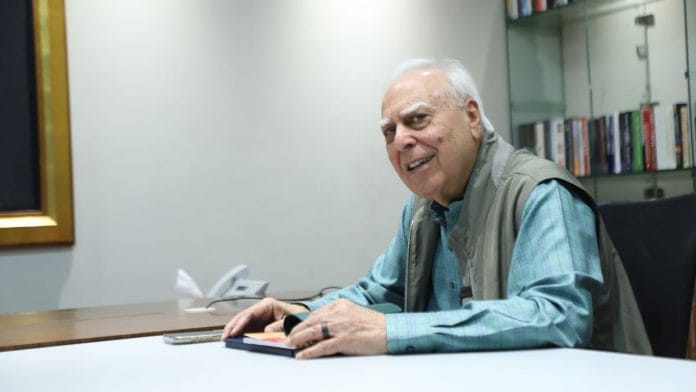New Delhi: Senior advocate and MP Kapil Sibal has said that the cash-at-judge’s home case documents should not have been made public till the completion of the ongoing “in-house” inquiry. No matter what the outcome of the case, the disclosure of the case documents make it a “zero-sum game” for the judiciary, he has added.
“I am totally against gag orders, but this was an ideal case where there should have been a gag order, saying we will not allow all this to happen in the public domain till our in-house procedure is over, right? Because you are dealing with an institution,” said Supreme Court Bar Association President Sibal, in an interview with ThePrint.
“Publicly, nothing should have been released … You can not release something—especially when it emanates from the judiciary because people will immediately believe it—and then have an in-house probe. The in-house probe should happen first, and then, if you come to a conclusion that something is wrong, there should be a release,” he said.
On 24 March this year, the Supreme Court, in an unprecedented move, uploaded several documents, photographs, and a video of the discovery of a large amount of cash at the residence of Justice Yashwant Varma, a Delhi High Court judge, on its official website. After a fire on his premises on 14 March, officials allegedly discovered the cash in a storeroom, with the judiciary, subsequently, facing the heat from the scandal.
Suggesting that because the case documents were made public, the judiciary would continue to face the heat even if the inquiry eventually proved the innocence of the judge, Sibal said, “The [case] outcome is a zero-sum game for the judiciary … if actually nothing is found, right—and he is one of our finest judges; quite frankly, we have never heard anything negative about the man—if nothing is found, the public will say you have protected him; you have covered up the incident.”
“If you go ahead with the matter, every litigant, when he loses a case, will say the judge was given money. So, it is a zero-sum game,” the Rajya Sabha MP added.
Asked how judicial accountability should be fixed in the backdrop of the cash found at the judge’s house and the Supreme Court looking into the case, Sibal said the need of the hour was putting an “institutional system” in place, “not an ad hoc response to a situation”.
Sibal said: “The institutional system means that you have to set up procedures. See, when you talk about the judiciary, we are not talking about some ordinary person, right? Because that is the only institution that can save us today. And the kind of constitutional onslaught that is taking place in the judiciary … So, when there are allegations against the judiciary—first of all—you must protect the institution till such time [that] you have absolute proof; you should not vilify the judge.”
The inquiry mechanism should be formulated after discussions with the bar association, the advocate added.
“You need to have an institutional mechanism, which you must put in place after discussions with the bar, and there must be constant interaction because we can tell the bar what it does not know, and it can tell us things we do not know. It will be a collaborative exercise because we want to actually deal with bad pennies; because one bad penny can give a bad name to the institution [judiciary]. We do not want that to happen because this is our life,” he said.
Sibal, however, ruled out that the National Judicial Appointments Commission (NJAC) was the answer to judicial accountability.
A constitutional bench of the Supreme Court, in 2015, declared the NJAC unconstitutional while ruling in favour of continuing the collegium system.
“I certainly believe that NJAC is no solution, at all. A government that can destroy all the institutions that we have … will even destroy the only institution that is left,” Sibal said.
Talking about judge selection, he added, “The government should be represented in the selection of judges; but the government should not have control over the selection of judges; therefore, you should have a broad-based selection process.”
(Edited by Madhurita Goswami)
Also Read: ‘Modi govt controls every aspect of our lives’ – Kapil Sibal at Sam Pitroda book launch







The Supreme Chief Justice of India (SCJI), Mr. Kapil Sibal, has given his verdict – “Justice Varma is innocent”.
Evidence:
“We have never heard anything negative about him. Quie frankly, in our opinion, he is one of our finest.”
Case dismissed.
So just because Mr. Kapil Sibal did not hear anything negative about “the man” and considers him to be one of our finest judges, the Supreme Court should declare Mr. Varma innocent.
Why have courts then? We can always Mr. Sibal for his opinion on an accused and if he has ever heard anything negative about the accused. If not, the accused can be declared innocent.
This way of dispensing justice would be really swift. Also, this will reduce the pendency clogging our judicial system.
I am sure this sibal is saying all this so that he can get more priority hearing for frivolous matters